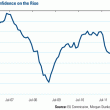by Lance Roberts of Street Talk Live blog,
Back in June I penned an article entitled "Is The Eurozone Crisis Set To Flare Up" which discussed some of the reasons why, despite Mario Draghi's pledge to "do anything", that I believed investors were overlooking the real risks to the financial markets and the domestic economy. Specifically I stated:
"With youth unemployment spiraling higher, economic stress rising and government revenue shrinking it is only a function of time until something goes horribly wrong. The timing of such an event, however, is the key. It is also questionable just how long Federal Reserve interventions can continue to keep the divergence between the Euro-zone, which is a major export partner and a big chunk of corporate profitability, and the U.S. from reverting.
There are still three major problems with the Euro-zone that, without fixing, will lead to the next chapter in the ongoing Euro-zone saga.
1) Lack of a constitutional and monetary union.
2) Lack of centralized fiscal and monetary policy controls.
3) Lack of centralized leadership.
The lack of a centralized constitutional and monetary union has led to several years of inaction in the process of unification of the Euro-zone. While it was a 'grand experiment' to run the Euro-zone under a single currency; the underlying structure to make it effective long term was never achieved. This is why fiscal reforms remain elusive and each and every promise made by the individual governments to the ECB and IMF for assistance eventually fail.
The problem for the Euro-zone is that without a centralized leadership with the ability to issue its own debt, strong fiscal/monetary policy tools and a central bank with a 'printing press' to support it, the survivability of the Euro-zone in the long term is likely doomed. Eventually, either smaller countries will want to withdraw from the Euro due to the pressures of austerity requirements or Germany will decide to quit bailing out bad behavior at the own country's expense. The problem then becomes who is going to make good on all the debt held, and guaranteed by, the ECB?"
With these comments in mind it was interesting to recently read an article from famed hedge fund Bridgewater Associates, headed by Ray Dalio, and their views on whether a perfect storm was brewing in Europe? Bridgewater started its commentary off by noting that:
"We are paid to worry. By keeping our eyes out for possible 'perfect storms' brewing on the horizon and identifying cheap ways of protecting ourselves when others are not paying attention to them we have been able to reduce portfolio risks and raise returns. Of course, like all perfect storms far on the horizon, it is difficult to know for sure that a confluence of events will occur. However, by finding them early and by watching them closely we can usually better assess their probability of materializing than the market does, which allows us to bet on protection when it is relatively cheap."
It is within this context of finding risks early that they note five potential issues facing Europe currently which could lead to a negative market event.
1) Financial institution stress tests could raise worries about specific banks (see chart below)
2) Plans for dealing with problematic banks could lead to Cyprus type situation
3) Portugal's debts problem signals worries for other countries as well
4) France's continuing debt build up could cause serious problems
5) International attention to all these problems could exacerbate the issues.
Bridgewater stated:
"This confluence of activities would cause sensible lenders to move from dangerous financial institutions to more secure ones, creating a variety of difficulties. Because of actual frailty in Western countries, another rise in costs and/or propagates could release material responses. Right now, both risk-free attention levels and credit score propagates are low and 'risky asset' costs high, so this threat is not priced in."
While the piece, which is worth reading in its entirety, covers the issues in detail - the most important point that will likely pose the greatest threat to the financial system in the short term are the upcoming stress tests of the European banks.
These test are likely to show the shortfalls of capital in the banks and could lead to a systemic crisis. This risk is further increased by the Basel III rules as they come into effect in the months ahead.
Bridgewater believes that Spanish and Italian banks will likely need a total of €19 billion. However, these banks are also the largest holders of soverign debt and have been increasing that exposure due to the ESM and ECB liquidity facilities. However, if the banks are held liable for holding soverign debt it will cause outside investors to be far more concerned about the relevant risks. This could lead to a shifting of assets back to more stable economies like the U.S. This risk increases Spanish and Italian banks need for capital to around €30 billion or they will need to reduce their exposure. Both events are a potential negative for the Eurozone and the markets.
As stated by Bridgewater:
"Policymakers will encounter a maze of considerations when sorting through upcoming decisions about how to deal with overly indebted sovereigns and their intertwined banks, all of which will require very thoughtful decisions involving second- and third-order consequences. To the extent that these are not handled well, the potential for considerable disruptions in peripheral funding exists, given the continued fragile state of things."
Since Mario Draghi's "do anything" speech last June there has been an amazing calm that has engulfed the Eurozone. This is due to the general belief is that no matter what happens the ECB will bailout the bond holders. However, that is the same sentiment that now exists everywhere as Central Bankers have seized control of the financial systems of the worldwide. The real issue, however, is that while investors are willing to sink dollars into an ever expanding maze of bad debt - no real progress has been made to cure the ills that created the crisis in the first place. Only four short years post the financial crisis and consumers ramping up debt, a new version of sub-prime is arising with REO-to-Rent bonds, automakers are thriving on subprime auto loans, asset markets are pushing historic extremes and leverage is back to all-time highs.
This is a combination that historically has not ended well. As the cartoon so adequately points out above - "Those who don't study history are doomed to reat it. Yet those who do study history are doomed to stand by helplessly while everyone else repeats it."















